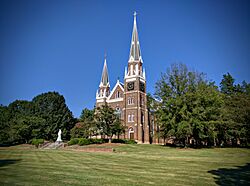Belmont Abbey, North Carolina facts for kids

The Abbey Basilica in 2009
|
|
| Monastery information | |
|---|---|
| Full name | Abbey Basilica of Mary, Help of Christians |
| Order | Benedictines |
| Established | April 1876 |
| Mother house | Saint Vincent Archabbey |
| Dedicated to | Mary, Help of Christians |
| Diocese | Charlotte |
| Controlled churches | Cathedral Basilica of St. Mary |
| People | |
| Founder(s) | Dom Herman Wolfe, O.S.B. |
| Abbot | The Rt. Rev. Placid Solari, O.S.B. |
| Important associated figures | Abbot-Bishop Leo Haid, O.S.B. |
| Architecture | |
| Status | active |
| Heritage designation | National Register of Historic Places |
| Style | Gothic Revival |
| Site | |
| Location | Belmont, North Carolina, United States |
| Coordinates | 35°15′41″N 81°02′38″W / 35.2613°N 81.0438°W |
|
Belmont Abbey Cathedral
|
|
| NRHP reference No. | 73001343 |
|---|---|
| Added to NRHP | April 11, 1973 |
The Abbey Basilica of Mary Help of Christians, often called Belmont Abbey, is a special Catholic place. It's a Benedictine monastery and a Minor Basilica located in Belmont, North Carolina, United States of America. A monastery is a community where monks live and pray together.
This important building was added to the National Register of Historic Places in 1973. This means it's recognized as a place with historical value.
Several popes have given Belmont Abbey special titles. Pope Leo XIII officially made it an abbey on December 19, 1884. An abbey is a larger, more independent monastery. Later, Pope Pius XII named Mary Help of Christians as its special protector in 1957. Finally, Pope John Paul II made the church a Minor basilica on July 27, 1998. A basilica is a church with special honors from the Pope.
Contents
History of Belmont Abbey
Founding the Monastery and College
In 1876, a Catholic priest named Father Jeremiah O'Connell bought a large piece of land. He had hoped to build a college in South Carolina, but it was destroyed during the American Civil War. He gave this new 500-acre farm in North Carolina to the Benedictine monks. He hoped they would start a school there.
The Benedictines came from Saint Vincent Archabbey in Pennsylvania. Under the leadership of Abbot Boniface Wimmer, they began building a monastery and a college. The monks used red clay from the land to construct the buildings.
Becoming an Abbey and First Abbot
On December 19, 1884, Pope Leo XIII issued a special order. This order changed the monastery into the Abbey of Mary Help of Christians. Father Leo Michael Haid was chosen as the first abbot. He led the abbey until he passed away in 1924.
In July 1886, the first three new monks made their promises to join the community. That same year, Abbot Haid started a seminary at Belmont. A seminary is a school for training priests.
On February 4, 1888, Abbot Haid was given another important role. He became the Vicar Apostolic of North Carolina. This meant he was a bishop in charge of a specific area. He was officially made a bishop on July 1, 1888. He was the first American abbot to also become a bishop.
In May 1891, a special shrine was opened at the abbey. It was called the Grotto of Our Lady of Lourdes. It became a place where people could come to pray. Katharine Drexel, a generous supporter of the monastery and college, visited Belmont Abbey in 1904.
The Abbey Church and Basilica
Construction on the Abbey Church of Mary Help of Christians began in 1892. It was finished and dedicated on April 11, 1894. The church is a large building shaped like a cross. It is built in the Gothic Revival style, which looks like old European cathedrals. It has a steep roof and two towers at the front.
On July 27, 1998, the Vatican gave the abbey church a special honor. It was raised to the rank of a minor basilica. Inside the church, there is a baptismal font. This font was carved from a stone that was once used in North Carolina.
Belmont Abbey College
Father Herman Wolfe and two students arrived in April 1876 to start the school. The first students graduated in 1878. In April 1886, the state of North Carolina gave Saint Mary's College a special permission. This allowed the school to grant college degrees.
In 1900, a fire destroyed two-thirds of the College Building. But rebuilding started right away. In 1913, Saint Mary's College changed its name to Belmont Abbey College.
On June 20, 2011, Belmont Abbey College started building a new residence. This building is for female students who are pregnant or have young children. It can house 15 babies, 15 women, and 8 toddlers. The women can stay for up to two years. This residence is called "Room at the Inn."
In May 2020, the college announced a new nursing program. This program helps train nurses to meet healthcare needs in Gaston County. On July 14, 1993, the central campus of the college was added to the National Register of Historic Places. It is known as the "Belmont Abbey National Historic District."
Belmont Abbey Today
Belmont Abbey is like a "motherhouse" to other Benedictine abbeys. These include Saint Leo Abbey in Florida and Mary Mother of the Church Abbey in Virginia. The monks also support Belmont Abbey College. This is a four-year Catholic college focused on liberal arts. As of 2020, there are about twenty monks living at Belmont Abbey.
See also
 In Spanish: Abadía de María Auxilio de los Cristianos (Belmont) para niños
In Spanish: Abadía de María Auxilio de los Cristianos (Belmont) para niños
 | Isaac Myers |
 | D. Hamilton Jackson |
 | A. Philip Randolph |



